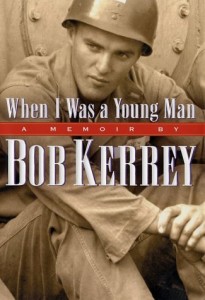 When I Was a Young Man: A Memoir, Bob Kerrey
When I Was a Young Man: A Memoir, Bob Kerrey
(Audio version, Audible Studios, 2014)
I was offered a free review copy of this audio book and accepted knowing I had the semester break to listen. I recognized the author as a politician, decorated war veteran, whom I thought had run for but not received the presidential nomination of the Democrat party. That was as far as my knowledge went, and it was enough to stir my curiosity.
I liked Kerrey’s writing style as well as his reading. It was straightforward and compelling. I particularly liked hearing his description of his childhood. His struggle with asthma while wanting to play football made a compelling story of perseverance. I was intrigued to hear of his church experience as well. Particularly interesting was his discussion of how the stories he heard shaped his world and where the stories came from. Kerrey stated, “My heroes came from stories I heard on Sunday. … I also learned heroic stories downtown at the Stuart Theater” where he watched the serials of Tarzan, Zorro and various cowboy movies. One of the stabilizing effects in his childhood was feeling “drawn to the great stories of the church and the parallel stores I saw on the Stuart Theater screen.” This was a reminder of the powerful impact of stories on our formation, and it made me wistful for a setting in which stories “on the screen” typically ran parallel to and supported the stories of the church.
I was also struck by his account of how a New Testament class impacted him. Since I teach such a NT survey class this was of particular interest. It was interesting that he seriously considered pursuing a ministerial vocation as a result of this class. It seemed that the Viet Nam war sidetracked this potential interest. It was sad that his reading for the NT class was Bultmann and Tillich. I wondered what might have happened if he had been introduced to more orthodox writers.
His experience in Viet Nam was clearly the central place where his story was going. I was intrigued by his first person account of training in one of the earliest SEAL teams and of what it was like to enter Viet Nam not knowing what to expect. Eventually he was seriously wounded, losing his leg, and was nominated for the Congressional Medal of Honor. His angst about the event for which he was awarded the Medal of Honor was clear but the reasons for it were not. Only after doing some web searching did I discover that there was controversy surrounding the event with contradicting stories and charges of killing civilians. I have no insight into sorting out those debates, but this account did demonstrate the terrible realities of war and the lingering effects on those involved.
The book closed in an odd way by returning to the story of his uncle who died in World War II. This left me uncertain as to what the author was trying to accomplish in the book as a whole. However, even with that oddity, the basic stories of a man’s life growing up from the 1940’s to the 1960’s was intriguing.